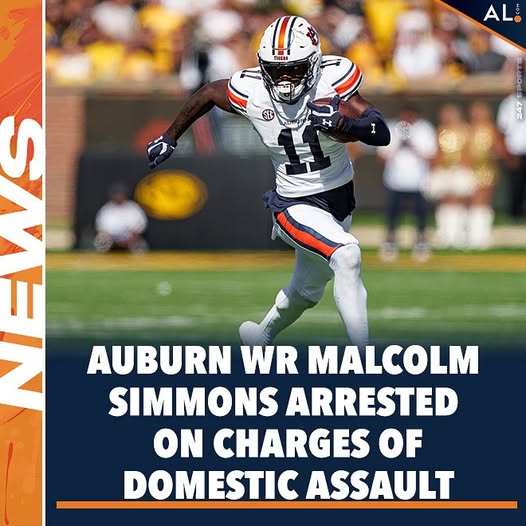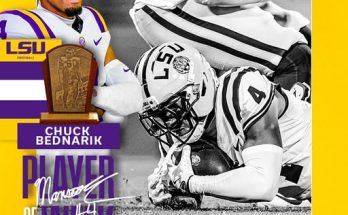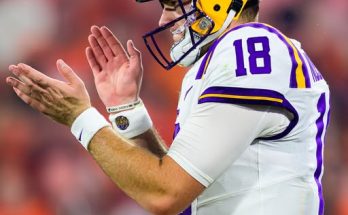When Tuesday morning broke over Auburn University, the tight-knit football community awoke to shocking news. A young, promising linebacker on Auburn’s roster was no longer part of the program. D’Angelo “D.J.” Barber, a redshirt freshman linebacker, had been arrested the previous day along with a companion, Marcell Brewster, during a routine traffic stop in Dadeville, Alabama. What transpired during that stop became headline news—agents discovered a disturbing cache tied to serious criminal charges. By Wednesday, Auburn head coach Hugh Freeze had confirmed that Barber had been dismissed from the Tigers’ football team following a violation of team rules (247Sports, SI).
The traffic stop occurred on Monday morning, July 7, when Dadeville police, monitoring traffic on US Highway 280, pulled over a 2019 GMC Yukon XL carrying Barber. Authorities initially noticed a minor traffic infraction but then observed signs that prompted a search of the vehicle—a decision that led to the discovery of a trove of illicit items. The Tallapoosa County Narcotics Task Force was soon called in to assist. Inside the vehicle, drugs and paraphernalia were found, including approximately two and half pounds of marijuana, THC-infused vaping products, digital scales and packaging materials consistent with distribution, a sum of $1,897 in cash, and a Glock 19 9mm handgun (WVTM).
The charges brought against Barber were formidable. In the eyes of Alabama law, trafficking marijuana is a Class A felony—among the most serious nonviolent drug offenses in the state. Complementing that were more pedestrian but still serious charges: unlawful possession of a controlled substance and unlawful possession of drug paraphernalia (WVTM). Brewster, his travel companion, faced being charged with unlawful possession of marijuana in the second degree and unlawful possession of drug paraphernalia (https://www.wsfa.com).
Barber, who had enrolled at Auburn in January 2024, was seen as an up‑and‑coming defensive talent. A three‑star recruit from the Class of 2024, he redshirted his freshman season after appearing in Auburn’s dominant 73‑3 victory over Alabama A&M. Though he didn’t record any notable game statistics, he remained a promising developmental asset—well-liked by coaches and teammates, known for his physicality and intelligence on the field (SI).
The portents of his future in football changed swiftly. Hugh Freeze, Auburn’s head coach, was direct: “DJ Barber is no longer a member of our football team due to a violation of team rules,” he stated after the arrest and revelations of the charges (SI). The university’s athletic department swiftly confirmed the dismissal. In parallel, Auburn issued a statement acknowledging the arrest, saying officials were gathering the facts and would take appropriate action (https://www.wsfa.com).
The speed and certainty of Barber’s dismissal highlighted two things: the gravity of the charges and Auburn’s attempt to maintain institutional integrity. College football teams, especially those under intense academic and legal scrutiny, often institute zero‑tolerance policies for conduct involving drugs and weapons. The possession of substantial quantities of marijuana—especially when tied to allegations of trafficking—signaled, under NCAA and state law, a clear violation of team code and conduct expectations.
More troubling than marijuana alone was the presence of a Glock 19 handgun. Though a handgun is not illegal per se, its presence in a vehicle containing drug‑related contraband exacerbates the charges and could trigger separate weapons offenses. Whether Barber had a legal firearm permit is unreported; however, given Alabama’s concealed carry laws and the totality of the circumstance, weapons charges remained a looming possibility .
This abrupt fall from grace serves as a sobering cautionary tale for student-athletes nationwide. Many come from environments marked by economic hardship, minimal adult supervision, and limited guidance—even champions of their communities. Yet once a player commits to an elite program, they enter a system that emphasizes mental resilience and maturity as much as physical talent. The path to national prominence runs straight—any deviation can bring swift derailment.
On campus, Auburn players and staff were left reeling. A freshman defender gone for the upcoming 2025 season. A locker to be emptied. Schedules reshuffled. A message to the squad: no one is above the rules. Freeze’s public repudiation underlines this reality. “We don’t tolerate this behavior,” he said, and university leadership made clear they would protect the program’s integrity while preserving player accountability .
Beyond Auburn’s walls, the legal process commenced. Barber was booked into the Tallapoosa County Jail on July 7. His bond was initially set at $28,500, a reflection of both the severity of the trafficking charge and the state’s assessment of flight risk (SI). While some reports mis-cited bond amounts or nuances, it is clear that by midweek, he had been temporarily released. The state weaponized Alabama’s legal machinery to hold him accountable.
If convicted of marijuana trafficking at the felony level, Barber could face a mandatory prison sentence. In Alabama, sentences for Class A drug felonies carry substantial jail time, often ranging between 10 and 99 years, though actual sentencing could vary depending on plea negotiations, criminal history, and judicial discretion. Lesser charges could result in lighter penalties—but none come without significant consequences.
Meanwhile, Auburn, like many Division I programs, faces scrutiny from the NCAA, public and donors. They must determine how effectively the university enforces its student‑athlete code and whether existing support systems for mental health and off-field behavior are robust enough. Programs have long argued that developing young men entails more than football drills—it requires education on life choices, consequences, and societal responsibility. Here, the question is how Auburn will process and formalize the lessons of Barber’s case into long-term institutional change.
We must also remember the unresolved human story behind this case. Barber, still a teenager at 19, hailed from Birmingham, Alabama—a city known for its deep football culture and economic divide. Many athletes in similar situations personally balance the pressure to provide for family, the norms of peer groups, and the temptation to engage in illegal activity. It isn’t intended to excuse criminal behavior, but rather to shed light on how such crossroads emerge for some youths early in life.
The broader conversation sparked by this incident transcends Auburn. College athletes are increasingly viewed as being held to higher standards—but that expectation brings great pressure. A single mistake, especially during off-season downtime, can lead to irreversible damage—loss of scholarship, deportation, or long-term setbacks. Many institutions have responded by enhancing player education, substance-awareness programs, and mentorship from former athletes well into their college years.
For Auburn, the departure of Barber is not the end of its linebacker depth chart reshuffle. The 2025 recruiting class remains intact, and redshirt options exist. Still, evaluating the situation through the lens of a team will bring fresh urgency to the leadership group. Captains, upperclassmen, and staff will likely navigate this moment, reinforcing that mistakes are tolerated, but moral compromise is not.
At a societal level, the case also stokes debate about marijuana laws in America. While some states have legalized adult recreational usage, Alabama has not. Trafficking tens of pounds is still a serious offense nationally. But many around the country view mass incarceration over marijuana as unjust, urging reform. On an emotional level, though, the more defining weapon in this case may be the Glock handgun, which transforms a drug violation into a potential violent‑crime scenario—magnifying the stakes for law enforcement and the courts.
As July progressed, Barber’s legal case advanced. Reports have confirmed an ongoing investigation within Tallapoosa County. Prosecutors will evaluate evidence for both controlled substance and weapons charges. Defense attorneys, if involved, must argue for reduced charges or alternative sentencing—perhaps through treatment programs or plea bargains. Even with political and administrative pressure, the courts will ultimately determine Barber’s fate.
For Auburn’s football program, Thursday’s headlines will pivot away from Barber’s saga, but internal ripple effects will remain. Coaches will explain to recruits that Auburn’s disciplinary architecture isn’t for show. Playbook adjustments begin. Linebacker coaches will press backups to be ready. And in locker-room conversations, the lost potential of a teammate will be felt.
Meanwhile, Barber, far from the campus he had recently joined, must come to terms with a future absent football. He’ll re-evaluate his support network—parents, mentors, attorneys. In an ideal outcome, he could seek redemption through personal rehabilitation, academic pursuit, or eventual legal reconciliation. Time, however, is not on his side; a criminal conviction could jeopardize any chance of returning to NCAA sports and significantly narrow life’s possibilities.
Young athletes look to figures like Barber: big, strong, fast, on the cusp of stardom. The temptation is real—to act out, to show bravado, maybe to indulge resentments or paranoia. What Barber’s case teaches is that choices have consequences—sometimes disproportionate. The espoused lessons of college athletics—forging character, developing resilience, teaching leadership—cannot coexist with weaponized irresponsibility.
At Auburn though, a new chapter begins, one informed by reflection. The departure of a single recruit is no seismic shift for a storied program—but the lessons can be. Staff training, risk assessment, testing protocols, mentoring initiatives, crisis communications—all come under sharper focus. As narratives shift toward fall practice and season objectives, Auburn must balance vigilance with compassion, oversight with opportunity.
The dismissal also echoes nationwide across sports. Just recently, Auburn wide receiver Malcom Simmons was arrested for domestic assault and strangulation, further spotlighting the program’s disciplinary challenges (Reuters). That incident, only days later, intensified scrutiny on Auburn athletics. With two off-field controversies back-to-back, pressure mounts on the athletic director and coaching staff to enforce policies consistently and to reinforce preventative education.
Consequences for Simmons remain unclear, but the optics for Auburn are undeniable: two arrests within eight days, one dismissal, one under investigation. These patterns fuel public demand for transparency. Booster meetings, university senate forums, and Tiger Talk calls will explore whether fund dollars support systemic reform or if athletics is isolated from academic accountability. These moments shape whether Auburn’s program is judged on its winning record—or on whether it builds men of integrity.
As the 2025 season approaches, the Auburn locker room will contain voices reflecting on Barber’s departure. Veteran players who remember the redshirt freshman may voice regret. Coaches will preach vigilance—avoid bad company, don’t drive late, call a ride. The messaging becomes part of team culture: trust but verify, discipline above talent.
Players across the SEC and ACC, witnessing Auburn’s public reckoning, will face internal questions as well. Is their own level of off-field accountability robust? They may ask: are there systems to help struggling players, to spot high-risk behavior early, to guide lost young men toward good choices? These are not hypothetical—they are essential components of a responsible college sports program.
For Barber himself, the road is murky. He remains eligible on paper—no NCAA infractions have been confirmed. But with a felony charge, reinstatement chances are remote. If convicted, his name may end up in college sports cautionary tales. Yet redemption is also part of sports lore. Some athletes have fallen deeply only to rise again through perseverance and maturity. But Barber’s case lacks such affirmative elements—he was dismissed, not suspended or placed on indefinite probation. The choice of words—“dismissal”—signals closure.
The societal conversation around him should be balanced: a young man who made grave mistakes, and whose actions harmed both himself and tarnished institutional reputation. Holding him fully accountable is necessary. Equally vital is providing support within legal and rehabilitation frameworks, if rehabilitative approaches are pursued. However, Auburn’s swift response indicates prevention is now priority—deterrence through clear enforcement.
Football fans tuning in this fall may spot a void where a linebacker could have been. They may wonder about the vanished athlete whose future grew bright in January 2024, only to falter by July 2025. But Barber’s story also affirms why college programs insist on rules: to impose standards that preserve fairness, safety, and values. Auburn’s choice wasn’t easy—but in their eyes, essential.
Barber’s arrest and dismissal are a microcosm of broader phenomena: criminal justice, marijuana policy, youth development, team culture, and institutional accountability. From drugs and weapon charges to school policy enforcement, his case touches on systemic issues that society grapples with constantly. The question it raises: is talent alone enough? Or must presence of character be non-negotiable? Auburn’s answer was clear—and swift.
As the legal system proceeds, the educational world watches. Parents, young athletes, coaches, mentors—they all learn anew the importance of structured guidance. Barber’s case underscores the gulf between youthful impulse and adult consequences. He was not just dismissed from a team—he faced a crossroads that will shape the rest of his life.
In the end, this cautionary tale leaves all of us with work to do. For athletes, it’s about knowing the rules—and why they exist. For programs, it’s about reinforcing a culture where character matters. For communities, it’s about building safety nets before mistakes become tragedies. And for Barber, it’s a personal journey through law and identity—a journey that could yet redefine him, if he chooses accountability and growth.
While Auburn moves forward, the lessons remain. D.J. Barber—a boy out of Birmingham, turned Tiger, then dismissed—will forever be part of Auburn’s narrative. His departure was sudden and painful, but perhaps it’ll catalyze system-wide reflection. His story reminds us: talent without wisdom is a flame that can burn its host. And in football—as in life—the real goal is not just touchdowns, but lives well-played.



